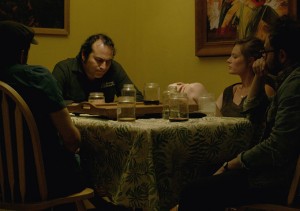Jesse Klein’s 2016 Tribeca Film Fest Wrap-Up
 The Tribeca Film Festival returned this April with a slate that again proved to be varied in its subject matter, tone and aesthetic approach. The fiction films proved innovative in their style and storytelling, the non-fiction films shed light on controversial political issues but always done with tact and care while hybrid films continue to push the boundaries of how these two poles can be labeled or understood, or, if this binary way of understanding is still relevant at all.
The Tribeca Film Festival returned this April with a slate that again proved to be varied in its subject matter, tone and aesthetic approach. The fiction films proved innovative in their style and storytelling, the non-fiction films shed light on controversial political issues but always done with tact and care while hybrid films continue to push the boundaries of how these two poles can be labeled or understood, or, if this binary way of understanding is still relevant at all.
Sophia Takal’s sophomore film Always Shine revisits themes of female jealousy explored in her first film, Green, albeit here with a new and more fractured storytelling technique. Mackenzie Davis and Caitlin FitzGerald are Anna and Beth, two LA actresses of varying degrees of success. The film follows them on a weekend getaway to Big Sur wherein their deep-rooted issues with one another—envy and resentment that quickly slips into a not-so-thinly-veiled-hatred—slowly bubble to the surface. The meditative, ponderous cinematography is offset by frenetic flash-forward edits; together they create a frenzy that unsettles as it invites you in. Davis sparkles here; like that gruesome car crash, it’s painful to witness but we can’t look away. The inevitability of her unraveling only magnifies her pathos. It’s eerily fitting that with the addition of a hyphen Anna and Beth could become one; perhaps they weren’t so different after all.
Nathan Silver and Mike Ott’s Actor Martinez had garnered a reputation even before it’s stateside premiere and for good reason, the film is a hybrid of the highest order, one that calls into question the very nature of performance, authenticity, and representation. Ott and Silver play themselves as they record Arthur Martinez, an amateur actor from Denver, as he goes about his daily routine of fixing computers, vaping, and attending local actor gatherings. Ott/Silver throw different wrenches into the work, most notably a potential love interest (played with wit and aplomb by Lindsay Burge), as Martinez grapples with his performance, such as it is, and ultimately his sense of self. It’s impossible to know if the film is completely fiction, completely non-fiction or anywhere between the two— indeed, Burge’s character “Lindsay” is often dubious as to the filmmakers’ intentions as she fears they are not so subtly mocking Martinez. Though to become a detective of authenticity is to perhaps miss the question that Ott and Silver are posing: is there ever a moment when we are not performing? Are we not our truest selves as soon as we admit that we’re fakes?
In Justin Tipping’s Kicks, a pair of stolen sneakers comes to stand in for one teenage boy’s future, livelihood, and sense of self. For Brandon (Jahking Guillory), a sweet pair of Jordans signifies a better life, a harbinger of wealth and acceptance from his peers and when they’re taken by Flaco (Kori Siriboe) the film becomes a journey for Brandon to set it right, to reassert his masculinity in an environment that defines it by dominance, often achieved by violent ends. The film contains surrealistic flourishes that open Brandon’s perspective to us, that elevate his world to the spectral, the dreamlike. The violent means and tragic ends that plague Brandon’s community comment upon societal structures that perpetuates these struggles, though offer no easy solutions— Brandon is alone, and whether he lives or dies is up to him.
This sentiment is echoed in the staggering and moving documentary Do Not Resist. No one needs convincing about the horrors of institutional racism, today as ever, yet this film’s even-keeled presentation of facts, facts that show the ties that bind the military industrial complex to residential police, further shocks and terrifies. The financial incentives put in place, the pressure to deliver so-called “criminals” create collusion and an obfuscation of the very notion of “guilty.” The introduction of body-worn cameras provide chilling insight; in one raid, a group of around 10 S.W.A.T. officers do not know where the raid in question is and so finally decide to put the address into one of their phones— their nonchalance, each and every smile, turns the stomach. When they arrive on site, feeling frustrated they’ve made no big bust, they arrest a young business owner, after finding a small bag of weed in his schoolbag. For everyone there, including the suspect/victim, there is little surprise, business as usual. We too are none too surprised at the corruption, but what this film does shed light upon is how deftly the various strands of political structures and agendas are woven together, wrapped in a deathlike embrace, rotten to its very core.
J.G. Ballard’s High Rise too looks at the perils of societal inequalities, here in the context of a futuristic apartment building, divided according to class. Director Ben Wheatley admirably brings the book to life in all its gleeful chaos. The story is Orwellian in its allegorical depiction of class war, of how we inherently create hierarchies and are subjugated by them, how natural it feels to be inhuman to our neighbor. The wonderful cast, Tom Hiddleston, Elizabeth Moss, Sienna Miller, and Jeremy Irons among others, show the absurdity of the world through the exuberance of their performance while never letting it seep over into caricature or melodrama. Despite the hyper-mania, the world remains tragic, because it is our own.
In the Hungarian documentary film Keep Quiet, directors Sam Blair and Joseph Martin turn their lens on Csanad Szegedi, a former far-right politician, renowned for spearheading a party vehement in its anti-Semitism. It’s chilling to see present-day anti-Semitic demonstrations and the directors do an excellent job in revealing how the rhetoric is subtly spread, how one can be seduced by bigotry. Szegedi soon finds out he is Jewish and is immediately cast out by his peers, now with no prospects, professional or otherwise. Over time he comes to accept and eventually embrace his Jewish heritage, though certain encounters seem to mirror the film’s own question about the veracity and authenticity of his convictions—he so readily jumps from one camp to another that one cannot help but be skeptical, however steadfast he appears. A visit with his grandmother, a Holocaust survivor, to Auschwitz late in the film reverberates most as he is forced to come face to face with events that defy human understanding. It is here where it seems he truly comes to know himself and his family, with no choice but to reckon with his own actions in the face of incomprehensible monstrosity, a site beyond performance, a place to bear witness, and be silent.
– Jesse Klein (@jessenoahklein)













